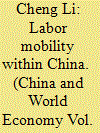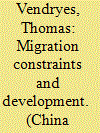|
|
|
Sort Order |
|
|
|
Items / Page
|
|
|
|
|
|
|
| Srl | Item |
| 1 |
ID:
141093


|
|
|
|
|
| Summary/Abstract |
In recent years, the Chinese central state has launched the “new socialist countryside” campaign (NSCC), which authorizes the local state expropriation of rural land from farmers, and then incorporates evicted farmers into township residence and urban citizenship. In affected regions, this campaign enables local state officials to enact practices of bureaucratic absorption that undermine potential resistance by bringing resisters into formal channels of bargaining through both juridical and ideological means. Based on ethnographic data from Sichuan province, this article reveals an in situ process of bureaucratic absorption in “Lan-ding village,” where the incorporation of rural residents into urban citizenship enables the depoliticization of resistance to land expropriation, first by changing the citizenship-based grounds on which legitimate claims to land can be made, then by discursively reframing eviction as a normative shift towards modern wage dependence.
|
|
|
|
|
|
|
|
|
|
|
|
|
|
|
|
| 2 |
ID:
147646


|
|
|
|
|
| Summary/Abstract |
Most migrant workers in mainland China are officially covered by the New Rural Cooperative Medical System (NRCMS), a rural health insurance system that operates in their home communities. The NRCMS and the system of household registration (户口, hukou) are tightly linked and systemically interdependent institutions. Migrant workers have difficulties benefitting from this social protection because it remains spatially separated from them. Only a minority have access to urban health insurance systems. This paper sheds light on the institutional origins of the coverage problem of migrant workers and examines crucial policy initiatives that attempt to solve it. In the context of the ongoing hukou reforms, these policies aim to partially dissolve the systemic interdependence of hukou and health insurance. While the policies provide feasible, yet conflict-prone, solutions in short-distance and concentrated bilateral migration systems, covering migrants who cross provincial boundaries remains a challenge.
|
|
|
|
|
|
|
|
|
|
|
|
|
|
|
|
| 3 |
ID:
182773


|
|
|
|
|
| Summary/Abstract |
In Chinese cities, migrants with rural hukou, compared to residents with local urban hukou, face more uncertainty, have limited access to mortgage finance, and are less eligible for low-cost housing. A simple model demonstrates that for these reasons, rural-to-urban migrants are less likely to own housing units in cities and as a result accumulate less wealth. Our empirical analysis examines a nationally representative household survey from 2013 and uses mother's hukou status as an instrumental variable. We find that household heads with rural hukou are about 20 percentage points less likely to own housing units in cities than comparable household heads with local urban hukou. Consequently, the average household head with a rural hukou owns 315 thousand yuan less housing wealth and 226 thousand yuan less total wealth than comparable household heads with local urban hukou. The average household head with a rural hukou has 288 thousand yuan less in housing capital gains than comparable household heads with local urban hukou. Moreover, we find that these differences are much larger in the first- and second-tier cities, cities with more stringent hukou regulations, and among younger cohorts.
|
|
|
|
|
|
|
|
|
|
|
|
|
|
|
|
| 4 |
ID:
145608


|
|
|
|
|
| Summary/Abstract |
Beijing is the cosmopolitan capital; Tianjin is an international harbor—but the surrounding Hebei province is mired in poverty. Beijing-based writer Karoline Kan outlines China’s plan to integrate these three areas, known collectively as Jing-Jin-Ji, and raise the living standards of Hebei’s 73 million residents.
|
|
|
|
|
|
|
|
|
|
|
|
|
|
|
|
| 5 |
ID:
094662


|
|
|
|
|
| Publication |
2010.
|
| Summary/Abstract |
Labor migration is institutionally restricted within China under the hukou system, China's registration system. However, what is the pecuniary impact of labor immobility on interregional wage inequality? To answer this question, we derive a simple wage gap equation including educational attainment, market potential and provincial border indicators. The regressions based on city and sector-level data show that, other things being equal, the wage dispersions within Chinese provincial borders are significantly less pronounced than those among provinces. Such border effects on spatial wage differentials, which have been shown to pervasively exist in all sectors considered in the present paper, reflect the distortions generated by migration controls. Finally, we show that despite the recent hukou reforms aimed at relaxing the restrictions on population movement, border effects appear to persisted over the period 2003-2005
|
|
|
|
|
|
|
|
|
|
|
|
|
|
|
|
| 6 |
ID:
127138


|
|
|
|
|
| Summary/Abstract |
In the post-Mao era from the 1980s, market reforms have seen profit-led neoliberal forces being introduced into China's urban spatial movements. In supporting such movements, labour mobility is allowed but the hukou system has been retained to prevent urban informality and slum formation and to control municipal public expenses. Without residency permits granted by the host cities, low-wage rural migrants enjoy little 'right to the city' and are deprived of local welfare and benefits. They often become 'drifting tenants', frequently driven by urban renewal, rising rentals and change of jobs. This study examines the spatial effect of causes (residency system) and consequences (frequent shifts in residence) experienced by low-skilled and low-wage migrants. A survey was conducted from February to mid-April 2011 in northwestern Beijing's Great Zhongguancun area which shows the marginalised state of displaced migrant tenants. This includes their adaptations to change, the pattern, causes and history of their intra-city mobility.
|
|
|
|
|
|
|
|
|
|
|
|
|
|
|
|
| 7 |
ID:
110509


|
|
|
|
|
| Publication |
2011.
|
| Summary/Abstract |
Rural-urban migration flows are a crucial corollary of economic development. The adverse or beneficial effects of internal migration, for sending as well as receiving areas, and the definition of optimal migration policies, have remained much discussed issues since the seminal works of Harris and Todaro (1970). This debate is especially acute in China where the "household registration system" (hukou) acts as a strong constraint on individual migration. This paper aims to assess the consequences of hukou through a simple model of a developing dual economy with overlapping generations. Contrary to existing studies focused on the contemporaneous allocation of economic resources, it deals with the dynamic consequences of migration flows and migration policies. It shows that, in fairly general circumstances, hukou-related migration constraints can actually hasten development, understood as the transfer of the labor force to the modern sector, driven by capital accumulation. The hukou system could thus be one of the causes of the extremely high Chinese saving rate and of the high pace of Chinese development. Insights from the model are confronted with stylized facts from the Chinese development, and theoretical results are especially consistent with the effects of the 2001 "towns and small cities" reform.
|
|
|
|
|
|
|
|
|
|
|
|
|
|
|
|
| 8 |
ID:
161883


|
|
|
|
|
| Summary/Abstract |
We use a unique, self-collected dataset to study the trade-offs between rural land holding and urban hukou facing Chinese rural households. Exploring the criteria used in the initial land allocation in the early 1980s, we argue that our finding of a negative relationship between land holding and permanent migration in terms of hukou change has a causal interpretation. We also contribute to the literature by empirically examining the impact of land holding on temporary and permanent migration decisions simultaneously. We find that land holding reduces the likelihood of permanent migration but has a smaller effect on temporary migration decisions. Using a hypothetical survey question, we find that providing full access to urban social benefits to even “landless” households would result in only a moderate increase in the number of rural individuals intending to settle permanently in urban areas. Our results suggest that reforms of rural land rights and urban social benefits alone may not be sufficient to attract a large proportion of rural individuals to permanently settle in urban areas.
|
|
|
|
|
|
|
|
|
|
|
|
|
|
|
|
| 9 |
ID:
158093


|
|
|
|
|
| Summary/Abstract |
Diverse types of mobility have emerged in contemporary China, among which consumption-led ethnic retired migrants have received little academic attention. This study addresses the seasonal mobility of retired Tibetan migrants who previously had careers in governmental and public sectors in Tibet. After retirement, they purchase second-home apartments in Chengdu for health and leisure reasons. Through semistructured interviews, nonparticipant observation, and the application of Schnell’s multidimensional model, this article analyzes the migration and adaptation experiences of retired Tibetan migrants in Chengdu. It is revealed that, physically, they reside in mixed communities and share activity spaces with the local people, and, socially, maintain their life-long social relationships and form new local relationships. They feel satisfied and comfortable in their new situation, maintain their primary identity as Tibetan, and gradually establish a sense of home in Chengdu. Their political privilege and governmental support in the destination also contribute to their positive migration and adaptation experiences.
|
|
|
|
|
|
|
|
|
|
|
|
|
|
|
|
| 10 |
ID:
147428


|
|
|
|
|
| Summary/Abstract |
The Hukou system's restriction of Chinese internal migration is controversial. This paper models internal migration in a dual economy and assesses the social welfare consequences of the Hukou system. It contrasts the effects of absolute prohibition of migration with the mere exclusion of migrants from certain services such as health care and education. Asymmetries between the rural and urban sectors mean that optimality may require different levels of utility in the two sectors. The existence of a floating population, however, is inconsistent with an optimal labor allocation.
|
|
|
|
|
|
|
|
|
|
|
|
|
|
|
|
| 11 |
ID:
171915


|
|
|
|
|
| Summary/Abstract |
While internal migration in contemporary China ascribes a great change to urban China's demographic composition, social structures and economic development trajectories, it is yet to restructure the formal definitions of urban identity and belonging, which are still dominated by the household registration system (hukou). The paper suggests that as a result of changes in the political, economic, demographic and social contexts within which China's internal migration develops, there emerge a crucial need to re‐examine the crude forms of determining identity and belonging, questioning the addressing of spatiality within the existing mechanisms (such as hukou system or the shiminhua discourse). To do so, the paper argues that the existing de‐territorialisation of the migration experience has to be replaced with a more nuanced understanding of how spatial practices and conceptualisations shape migrants’ experiences, as it is becoming imperative to develop a new framework that is more sensitive to migrants’ lived process of identification and belonging, especially as these traverse multiple geographies and spatial scales. This close engagement with migrants’ spatiality can then be used as a base from which to engage with a more complex view of migrants’ spatial and social relatedness, as well as the development of their urban belonging and identity.
|
|
|
|
|
|
|
|
|
|
|
|
|
|
|
|
|
|
|
|
|